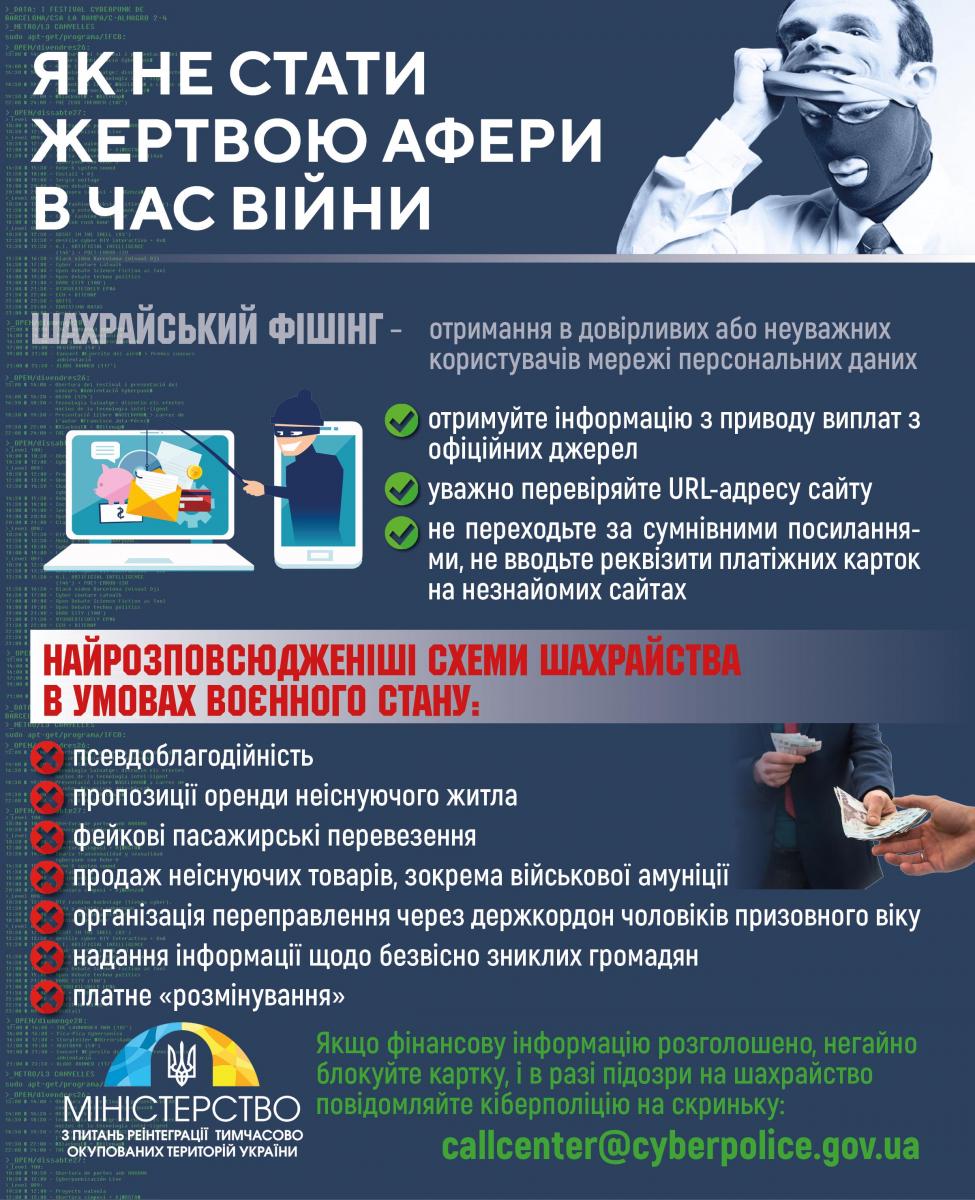
While some Ukrainians are defending the country from the enemy with weapons in their hands, rebuilding the economy, helping refugees, others are working on criminal cases.
Using the current general emotional tension and hype on the topics of survival and security, swindlers have modified their former thieving schemes to the realities of war or invented “innovations” to make money on misery and grief.
Let’s look at the most typical of them and find out how not to fall victim to criminals.
– Phishing: hunting on internally displacement people (hereinafter – IDP)
Cyberpolice warns: scammers are now becoming more active, who use phishing (obtaining personal data from gullible or inattentive users of the personal data network) to extort people money under the guise of providing state benefits to IDP. SMS about the payment of assistance to IDP are sent with a link to the resource, where you can allegedly apply for it. Citizens are asked to enter personal data and a bank card number to credit money. Multiple keystrokes –
and criminals misappropriate your money.
ATTENTION! How not to get caught:
-receive information about payments from official sources;
-Check the site URL carefully, as one inconspicuous symbol may indicate that you have been caught on a phishing resource.
-do not follow questionable links, do not enter payment card details on suspicious and unfamiliar sites;
-If financial information is disclosed, the card should be blocked immediately, and in case of suspicion of such fraud, inform the cyber police at the following box: [email protected]
– Fake “philanthropists” and services
The topic is not new – there are people who have been successfully playing the role of volunteers for years, or not indifferent, who allegedly raise money for expensive operations for children, Anti-terroristic operation / Joint Force Operations (hereinafter – ATO/JFO) soldiers, donations to animal shelters, fire engines and etc. And then they are simply appropriated. The war brought to the forefront of such cyber-scams.
The most common schemes of fraud in martial law:
-pseudo-charity;
-proposals for renting non-existent housing for migrants;
-fake passenger transportation and sale of non-existent goods, including military ammunition;
– fraud under the guise of organizing the crossing of the state border of men of military age;
– fake provision of information on missing citizens.
ATTENTION! How not to get caught:
– transfer money only to the accounts of official charitable foundations, accounts listed on the NBU website, or through the “Diya” application. If possible, give preference to postpay for goods and services;
-️ abandon the idea of ”ordering documents that will allow men aged 18-60 to cross the border”: not only will you fall victim to fraud, but also have to answer to the law;
– Try not to follow the links received via SMS or messengers;
– if possible, use official applications: application “Action”, applications of banking institutions, etc .;
– avoid entering personal or bank data on third-party resources; if you are asked to transfer money to the services of a notary or pay a commission to receive government benefits, probably – works a swindler.
– “Paid” demining
The State Emergency Service (SES) said that in Ukraine there have been some cases when some criminals in the deoccupied territories and areas under fire, under the guise of pyrotechnicians, offer people for money to conduct a survey of their surroundings for explosives.
ATTENTION! Demining is not done for money!
SES performs all work exclusively free of charge – according to plans and in order of priority.
– Apartment and bus “throws”
Such scams are among the top fraudulent schemes.
Some of the defendants who were exposed managed to deceive several hundred people in this way. The National Bank of Ukraine recently shared quite valuable recommendations on how to avoid such situations and protect oneself from financial risks.
ATTENTION! How not to get caught:
– do not pay in advance;
– Check the service providers in several ways: if there are acquaintances in the city where you plan to rent housing, ask them to check the housing at the address and meet with landlords.
- Buy train or bus tickets only on official online resources; in the case of private car transport – insist on payment in cash at the time of departure.


